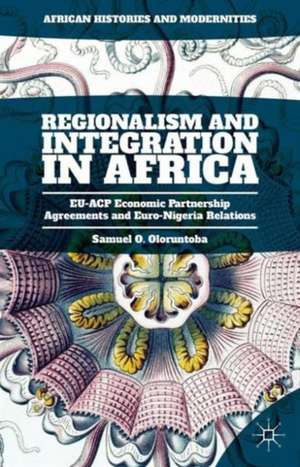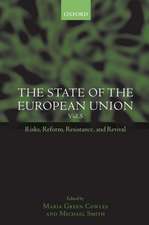Regionalism and Integration in Africa: EU-ACP Economic Partnership Agreements and Euro-Nigeria Relations: African Histories and Modernities
Autor Samuel O. Oloruntobaen Limba Engleză Hardback – 10 noi 2015
Din seria African Histories and Modernities
- 15%
 Preț: 695.01 lei
Preț: 695.01 lei - 20%
 Preț: 815.69 lei
Preț: 815.69 lei -
 Preț: 384.09 lei
Preț: 384.09 lei - 15%
 Preț: 577.54 lei
Preț: 577.54 lei - 18%
 Preț: 733.33 lei
Preț: 733.33 lei - 18%
 Preț: 734.27 lei
Preț: 734.27 lei - 18%
 Preț: 739.31 lei
Preț: 739.31 lei - 15%
 Preț: 587.85 lei
Preț: 587.85 lei - 15%
 Preț: 642.51 lei
Preț: 642.51 lei -
 Preț: 418.45 lei
Preț: 418.45 lei - 15%
 Preț: 641.71 lei
Preț: 641.71 lei - 15%
 Preț: 704.17 lei
Preț: 704.17 lei - 18%
 Preț: 733.33 lei
Preț: 733.33 lei - 15%
 Preț: 703.38 lei
Preț: 703.38 lei - 15%
 Preț: 527.32 lei
Preț: 527.32 lei - 15%
 Preț: 698.94 lei
Preț: 698.94 lei -
 Preț: 485.61 lei
Preț: 485.61 lei -
 Preț: 386.99 lei
Preț: 386.99 lei - 15%
 Preț: 704.87 lei
Preț: 704.87 lei - 18%
 Preț: 781.45 lei
Preț: 781.45 lei - 18%
 Preț: 894.97 lei
Preț: 894.97 lei - 15%
 Preț: 694.69 lei
Preț: 694.69 lei - 9%
 Preț: 753.51 lei
Preț: 753.51 lei - 15%
 Preț: 641.16 lei
Preț: 641.16 lei - 18%
 Preț: 783.20 lei
Preț: 783.20 lei - 15%
 Preț: 643.00 lei
Preț: 643.00 lei - 18%
 Preț: 900.49 lei
Preț: 900.49 lei - 15%
 Preț: 699.59 lei
Preț: 699.59 lei - 15%
 Preț: 644.49 lei
Preț: 644.49 lei - 15%
 Preț: 587.53 lei
Preț: 587.53 lei - 15%
 Preț: 703.06 lei
Preț: 703.06 lei - 15%
 Preț: 587.39 lei
Preț: 587.39 lei - 15%
 Preț: 582.63 lei
Preț: 582.63 lei - 15%
 Preț: 586.88 lei
Preț: 586.88 lei -
 Preț: 385.47 lei
Preț: 385.47 lei - 15%
 Preț: 703.71 lei
Preț: 703.71 lei - 18%
 Preț: 744.22 lei
Preț: 744.22 lei - 15%
 Preț: 643.16 lei
Preț: 643.16 lei - 15%
 Preț: 590.95 lei
Preț: 590.95 lei - 15%
 Preț: 587.53 lei
Preț: 587.53 lei
Preț: 389.11 lei
Nou
Puncte Express: 584
Preț estimativ în valută:
74.47€ • 77.46$ • 61.48£
74.47€ • 77.46$ • 61.48£
Carte tipărită la comandă
Livrare economică 15-29 aprilie
Preluare comenzi: 021 569.72.76
Specificații
ISBN-13: 9781137568656
ISBN-10: 1137568658
Pagini: 236
Ilustrații: XIV, 236 p.
Dimensiuni: 140 x 216 x 16 mm
Greutate: 0.44 kg
Ediția:1st ed. 2016
Editura: Palgrave Macmillan US
Colecția Palgrave Macmillan
Seria African Histories and Modernities
Locul publicării:New York, United States
ISBN-10: 1137568658
Pagini: 236
Ilustrații: XIV, 236 p.
Dimensiuni: 140 x 216 x 16 mm
Greutate: 0.44 kg
Ediția:1st ed. 2016
Editura: Palgrave Macmillan US
Colecția Palgrave Macmillan
Seria African Histories and Modernities
Locul publicării:New York, United States
Cuprins
1. Regionalism and Integration in Africa: Euro-Nigeria relations and Economic Partnership
2. Globalization and Regional Trade Agreements
3. Theoretical Framework of North-South Regional Trade Agreements
4. History of Euro-Africa Relations: From Yaoundé Convention to Economic Partnership Agreements
5. Eurozone Crisis and implications for the funding of the Economic Partnership Agreements
6. Economic Partnership Agreements and Their Implications on Macro-economic Developments in Nigeria
7. Economic Partnership Agreements and the Non-Oil Exports in Nigeria
8. State Capacity and Trade Policy in Nigeria: A Discourse on the EU-ACP Economic Partnership Agreements
9. The Political Economy of Regional Integration and Development in Africa: Rethinking Theory and Praxis
10. Regionalism or Multilateralism: Building National Competitiveness for Economic Development in Africa
2. Globalization and Regional Trade Agreements
3. Theoretical Framework of North-South Regional Trade Agreements
4. History of Euro-Africa Relations: From Yaoundé Convention to Economic Partnership Agreements
5. Eurozone Crisis and implications for the funding of the Economic Partnership Agreements
6. Economic Partnership Agreements and Their Implications on Macro-economic Developments in Nigeria
7. Economic Partnership Agreements and the Non-Oil Exports in Nigeria
8. State Capacity and Trade Policy in Nigeria: A Discourse on the EU-ACP Economic Partnership Agreements
9. The Political Economy of Regional Integration and Development in Africa: Rethinking Theory and Praxis
10. Regionalism or Multilateralism: Building National Competitiveness for Economic Development in Africa
Recenzii
“Moving deftly between Nigerian, sub-regional, and continental debates on how best to reposition African actors in a globalized world defined by the triumph of Euro-American (and Chinese) capitalist hegemony disguised as globalization, Oloruntoba’s analysis is illuminating in its sweep and depth. Oloruntoba demonstrates how an African integrative agenda can encourage regional flows in multiple sectors, correct the power imbalance between Africa and the rest of the world, and confer autonomous agency on African actors in bilateral and multilateral negotiations.”
-Moses Ochonu, Professor of History, Vanderbilt University, USA
"Oloruntoba has made a significant contribution to challenging the dominant Eurocentric narrative on the relations between Europe and Africa. It is a must read book."
-Yash Tandon, Founder-Chairman, Southern and Eastern African Trade Information and Negotiations Institute, Uganda.
Notă biografică
Samuel O. Oloruntoba is a Senior Lecturer at the Thabo Mbeki African Leadership Institute, University of South Africa, Pretoria, South Africa. He obtained his PhD in Political Science with specialization in International Political of Economy from the University of Lagos, Nigeria. He was previously a Visiting Scholar at the Program of African Studies, Northwestern University and Brown University, USA.
Textul de pe ultima copertă
The resurgence of regionalism is borne out of the current political logjams that have characterized the governance and operations of multilateral trading system over the past one decade and a half. Oloruntoba critically examines Euro-Nigeria relations within the context of the Economic Partnership Agreements in terms of the political and economic implications of the agreements on Nigeria’s non-oil exports sub-sectors. Set within one of the main objectives of the Economic Partnership Agreements, he also interrogates the prospects and challenges of regional integration in Africa under the regime of transnational accumulation, which the Economic Partnership Agreements represents.











